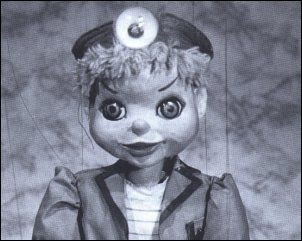Lady Penelope adjusted the folds of her silken robe as she looked down at me, curled up at the foot of the Chesterfield in her hotel suite. The lights of Demeter City glowed softly through the window, casting pastel blues and purples across the room. I was completely knackered, my hair tousled, my eyes half-shut, and my little limbs draped across the carpet like I’d melted.
“Darling, you look utterly worn out,” she said, brushing a strand of hair from my cheek. “Did you sleep at all during your little adventure?”
I gave a sleepy sigh and murmured, “Sort of. But I had the best time with Slomo…”
And just like that, the memory of our whirlwind sleepover began to bubble up in my tired little brain…
The night before, Slomo had invited me to stay at a hotel in Demeter City—an old retro-futuristic place with smooth curves, glowing floor panels, and a rooftop hot tub that overlooked the twinkling skyline. Slomo and I had stepped into the hot tub together just as the stars came out, the bubbles fizzing around us like we were inside a great big soda bottle.
I leaned against his cool metallic frame, giggling as he gently extended one of his robot arms to mimic a splash. He wasn’t built for water, but he had waterproofed himself just for tonight. We cuddled up close, sharing sleepy stories and warm snuggles, the kind only siblings can give.
Slomo had a way of whirring softly, like a lullaby, and when he tilted his head, I couldn’t help but laugh. “You're the comfiest robot in the whole galaxy,” I whispered, resting my head on his shoulder.
The next morning, all dewy with dreams and warm towels, we wandered down to a nearby coffee shop for something to perk us up. It was bustling, full of aliens and humans ordering double-caffeinated glopachinos and buttery croissant clones. Slomo blinked at the menu, then blinked at me.
“You smell like a hot tub,” he said.
“You smell like warm toast,” I replied.
Just as we settled down with our drinks, the music changed. A DJ in the corner slid on some visors and raised the volume—an all-night rager was revving up.
“Should we?” Slomo asked, flicking his LED eyebrows suggestively.
“I think we must,” I said, standing on my tiptoes to hold his metallic hand.
And off we went.
The rager was wild. A full-blown neon-lit alien dance party. Creatures from every quadrant danced like their limbs were made of jelly. I drank something fizzy and bright green that made my feet tingle. Slomo had four cans of Coke Zero wired into his frame and spun in circles so fast he became a disco ball.
We danced like nobody was watching—because by 4am, nobody was. They were all asleep. Passed out across beanbags, under tables, and in booths with spilled chips and blinking glowsticks. I blinked at Slomo, who blinked back.
“We should probably get back,” I mumbled, feeling the world wobble slightly.
We stumbled outside, tipsy and giggly, and found a hovercar parked just off the curb with the keys still humming.
“Slomo, that car’s winking at us.”
“I believe it wants to go home,” he said.
And so we stole it. Giggling the whole way, we somehow made it back to the hotel without crashing, getting caught, or even dropping our half-eaten bag of cheesy noodles. Slomo parked it in a flowerbed and saluted.
That night, back in the rooftop hot tub, we didn’t say much. Just floated in the warm fizz, sharing popcorn and more Coke Zero. We watched the stars, counted blinking satellites, and traded lazy tickles and gentle cuddles under the city sky.
“You’re like my space brother,” I whispered.
“And you are my sleepy human bean,” Slomo replied with a tiny beep.
Back in our hotel room, the bed was soft and downy, like sleeping inside a cloud with arms. Slomo nestled beside me, clicking his sleepy circuits into snooze mode. We snuggled close under the blanket, heads tucked together. He tickled my back gently with a robotic finger. I curled up tighter and whispered, “Don’t ever let the night end.”
He replied with a soft, robotic hum: “Then let’s stay in the dream a little longer.”
But morning came anyway. I woke up feeling blue. Something tight and sad bubbled up in my chest. Maybe it was leaving, maybe it was too much fizzy drink, or maybe I just missed home.
Slomo noticed right away. He tucked me under his arm and whispered, “Hey, you’re safe. You’re with me. You’re loved.”
I nodded slowly. “Can we go tell Podley and the others? I just want them to know…”
So we made our way to the 88th Precinct. Podley raised an eyebrow when he saw us. Romek and Orrin perked up. I tried to tell them everything—about the dance, the stars, the cuddles, the silly things, the hovercar. But halfway through, I just… collapsed.
Swoosh. Out cold.
Back in the present, Lady Penelope gently scooped me up into her arms. My face nuzzled against her satin shoulder as she carried me toward the suite bedroom.
Slomo wheeled into the room, where Parker was polishing his shoes. The old butler blinked in mild surprise.
“I say… he looks completely spent.”
Slomo nodded. “She partied harder than most kids I’ve met.”
“But she’s a good one,” Lady Penelope whispered. “She’s got heart.”
Slomo's eyes dimmed gently, like a lamp being turned low. “She always had the biggest one.”
And with that, she tucked me into bed—soft, warm, and finally still—while Slomo powered down beside me, guarding my dreams like the sibling I never knew I needed.
The End.







.jpeg)



